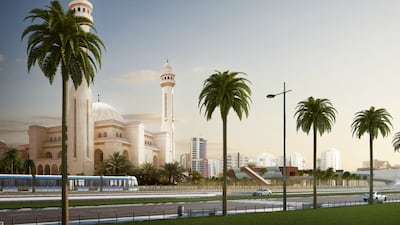Bahrain’s transport ministry will “soon” begin calling for bids to pre-qualify developers on phase 1 of Bahrain Metro, Kamal bin Ahmed Mohammed, the country’s minister of transport and telecommunications, said.
The tender will be floated within the next month or two, the minister told The National on the sidelines of the Middle East Rail exhibition in Dubai on Tuesday.
“We expect to go to market soon to pre-qualify developers that can participate in phase 1 of Bahrain Metro,” he said. “It’s a process. We have to start with pre-qualifications, receive bids, evaluate them and then we can go to the next phase after getting all the approvals from the government.”
Phase 1 of the Bahrain Metro network’s ambitious plans comprises two lines with an estimated length of 29 kilometres. There will be 20 stations with two interchanges. The entire network of the electric driverless train system spans 109km and will be executed in phases. Upon completion, the system will have the capacity to transport 43,000 passengers per hour.
Valued at an estimated $1.5 billion to $2bn, the project is touted as part of Bahrain’s sustainable urban mobility goals.
Bahrain, the smallest economy in the Gulf, has faced economic headwinds during the Covid-19 pandemic. Its economy is estimated to have shrunk 5.4 per cent in 2020, driven by a sharp contraction in non-oil output.
According to International Monetary Fund projections, Bahrain’s economy contracted 7 per cent but is set to expand 3.3 per cent this year on the back of its quick response to minimise the economic fallout of the pandemic.
The country’s non-oil economy will grow 3.9 per cent in 2021 as widespread vaccine distribution revives economic activity towards pre-crisis levels, according to the IMF.








